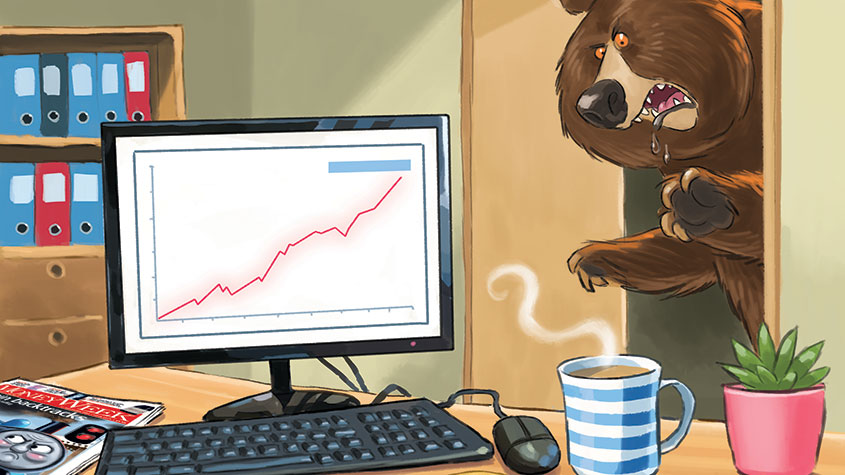The Brexit effect on house prices
If the chancellor keeps going on about how Brexit will push down house prices, says Merryn Somerset Webb, Brexit may be exactly what he gets.

Get the latest financial news, insights and expert analysis from our award-winning MoneyWeek team, to help you understand what really matters when it comes to your finances.
You are now subscribed
Your newsletter sign-up was successful
Want to add more newsletters?

Twice daily
MoneyWeek
Get the latest financial news, insights and expert analysis from our award-winning MoneyWeek team, to help you understand what really matters when it comes to your finances.

Four times a week
Look After My Bills
Sign up to our free money-saving newsletter, filled with the latest news and expert advice to help you find the best tips and deals for managing your bills. Start saving today!
When David Cameron agreed to a referendum on EU membership, I suspect he thought it would be an easy win. He clearly doesn't now. The prime minister has rolled out every big hitter he can find to back his claim that British and global security will be at risk if we vote leave. But George Osborne has gone a step further straight for the thing the British care most about: house prices.
The chancellor reckons there will be a "significant hit to the value of people's homes and to the cost of mortgages" if we vote out. He may be right. But he may be wrong if Brexit is the disaster he says he expects, surely interest rates are more likely to fall than rise? If Brexit causes an EU collapse and security meltdown, might there not be a flood of French house buyers into the safe haven that is, and presumably still will be, London? House prices could go up, not down.
And Osborne might be on dodgy ground appealing to people to vote to keep house prices high. It's worked for years. The UK has long been a nation of homeowners what would be more natural than for those homeowners to want the price of their major asset to rise and rise? But times have changed. The percentage of households that own a home is falling (it is at its lowest for 29 years). The percentage of renters is rising. And, as prices have risen far beyond salaries, the average age of the first-time buyer has shot up: ten years ago 59% of the 25-to-34 age group were owner occupiers. Now it's 36%.
MoneyWeek
Subscribe to MoneyWeek today and get your first six magazine issues absolutely FREE

Sign up to Money Morning
Don't miss the latest investment and personal finances news, market analysis, plus money-saving tips with our free twice-daily newsletter
Don't miss the latest investment and personal finances news, market analysis, plus money-saving tips with our free twice-daily newsletter
The result? Parents and grandparents have begun to fear that their young will never have the security of owning their own home. And they are trying to find ways to help out. That means the return of the 100% mortgage guaranteed by a parent. And the rise of the Bank of Mum and Dad (forecast by Legal & General to be involved in 25% of all mortgage transactions this year) and the introduction of new age limits: Nationwide is now to let borrowers keep their loans until they are 85.
This is worrying. It is also, I think, changing the way people think about houses. The 7.4 million owners with no mortgages no longer need prices to rise (they live in their houses). They need them to fall so their families can have houses too. If Osborne keeps going on about Brexit pushing house prices down, he might find that Brexit is exactly what he gets.
For more on this and everything else to do with the referendum, see ourexclusive MoneyWeek interview with Boris Johnson in this week's issue on why he reckons the only safe thing to do on 23 June is to vote Leave.
Get the latest financial news, insights and expert analysis from our award-winning MoneyWeek team, to help you understand what really matters when it comes to your finances.

-
 Early signs of the AI apocalypse?
Early signs of the AI apocalypse?Uncertainty is rife as investors question what the impact of AI will be.
-
 Reach for the stars to boost Britain's space industry
Reach for the stars to boost Britain's space industryopinion We can’t afford to neglect Britain's space industry. Unfortunately, the government is taking completely the wrong approach, says Matthew Lynn
-
 What to do as the age of cheap money and overpriced equities ends
What to do as the age of cheap money and overpriced equities endsEditor's letter The age of cheap money, overpriced equities and negative interest rates is over. The great bond bull market is over. All this means you will be losing money, says Merryn Somerset Webb. What can you do to protect yourself?
-
 Investors are bullish – but be very careful
Investors are bullish – but be very carefulEditor's letter Many investors are buying the dip, convinced the latest upswing is the start of a new bull market. The odds are that it’s not, says Andrew Van Sickle. The bear has unfinished business.
-
The MoneyWeek approach to investing
Editor's letter At MoneyWeek, our aim is simple: to give you intelligent and enjoyable commentary on the most important financial stories, and tell you how to profit from them. So how do we do that?
-
 Celebrity bitcoin ads echo the subprime mortgage crisis
Celebrity bitcoin ads echo the subprime mortgage crisisEditor's letter A wave of ads featuring celebrities punting crypto to the masses are reminiscent of how low income Americans were encouraged to take on loans they couldn’t afford, says Merryn Somerset Webb.
-
 Will the UK's property slowdown turn into a house-price crash?
Will the UK's property slowdown turn into a house-price crash?Editor's letter As the cost-of-living crisis intensifies and interest rate rise, it is hard to see reasons for UK house prices to keep rising, says Merryn Somerset Webb.
-
 The unintended consequences of ESG investing
The unintended consequences of ESG investingEditor's letter Many people are refusing to invest in energy companies, citing "ESG" concerns. But we still need fossil fuels, says Merryn Somerset Webb, and will for years to come. Boycotting the sector is a bad idea.
-
 What sardines can teach investors about today's markets
What sardines can teach investors about today's marketsEditor's letter A California tale of “eating sardines” and “trading sardines” can help us divide investments into speculative and real, says Merryn Somerset Webb. Something that's very useful when looking at today’s markets.
-
 The market finally seems to be getting it
The market finally seems to be getting itEditor's letter Reality checks are coming fast to the markets, says Merryn Somerset Webb – with even 2022’s safe havens beginning to reflect recession worries.